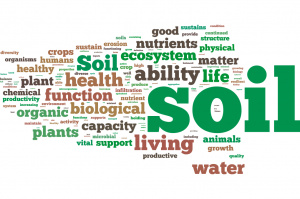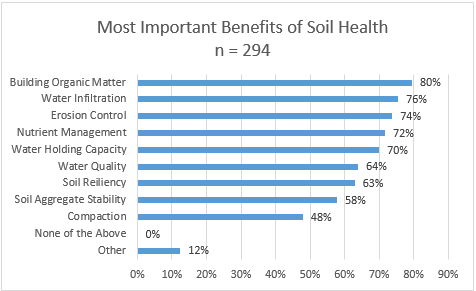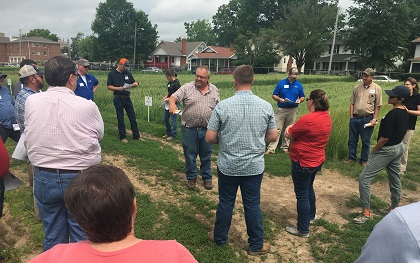Understanding Farmers, Educators, and Agency Staff’s Perceptions of Soil Health
Over the past decade, there has been significant research aiming to better understand the biophysical processes and indicators of soil health. Significantly less research however, has been dedicated to understanding people’s perceptions surrounding soil health. To help address this research gap, the Soil Health Nexus team conducted a survey to better understand how different audiences define soil health, growers’ perceived barriers to adopting soil health practices and resource needs for teaching soil health.
An online survey was distributed to producers, agronomists, extension agricultural educators, state and federal agency staff, consultants, and soil and water conservation district staff from January to August 2018 using a snowball sampling technique. The survey was distributed to the Soil Health Nexus team, state soil health officials, and state extension educators who then shared the survey with their professional networks in the North Central Region culminating in 294 respondents.

Wordle of how survey respondents define soil health
Overall, the survey showed a nuanced view of how soil health is perceived throughout the region. When asked to define soil health, respondents’ answers varied from biology, water functionality, and structure, to sustainability and productivity. Answers were coded thematically and broken down into two categories – characteristics of healthy soil such as physical, biological and chemical properties of soil health; and effects of healthy soil, or the outputs of soil health such as productivity, stability and sustainability. Interestingly, when broken down by audience, we see that extension educators and state and federal agency staff were more likely to mention the effects or impacts of healthy soil than farmers. Extension educators, and to a lesser extent state and federal agency staff, were also more likely to associate soil health with productivity than farmers.
When examining barriers to adopting soil health, many respondents noted the lack of evidence on the economic benefits of soil health as a barrier and wanted more education on the economic benefits of specific practices. Producers in particular were interested in soil health practices that benefit the productivity of their crops, but concerned with the economic challenges these practices pose. Other barriers to adoption outside of economic factors were single-season land rentals, general resistance to change, and management concerns.
Looking at educating audiences on soil health, respondents noted they lacked soil health knowledge and wanted more information on implementing certain soil health practices. When asked on the method of education, field days and factsheets were noted to be helpful. Interestingly, less than 38% of respondents indicated that webinars were helpful in the past, but 66% would like to see more webinars moving forward. It is also worth noting that producers, unlike other audiences, found email discussion groups helpful in learning and making decisions about soil health.
 Respondents noted that building organic matter, water infiltration, erosion control, nutrient management, and water holding capacity were the five soil health benefits most important to them, however, overall respondents felt a number of benefits were important. Interestingly, there are some variations in the perceived importance of soil health benefits across different groups. For example, farmers and consultants indicated higher importance to nutrient management compared to state and federal agency staff and extension educators.
Respondents noted that building organic matter, water infiltration, erosion control, nutrient management, and water holding capacity were the five soil health benefits most important to them, however, overall respondents felt a number of benefits were important. Interestingly, there are some variations in the perceived importance of soil health benefits across different groups. For example, farmers and consultants indicated higher importance to nutrient management compared to state and federal agency staff and extension educators.
This information is key in helping educators ensure they are focusing on the right soil health information, and are reaching their audiences through the channels that work best for them – whether that be field days, webinars or email discussion groups. Moreover, this information has implications for communicating soil health as farmers may not be as likely to recognize the impacts of soil health compared to other audience groups.
More information, and the full data-brief, is available through the Nexus’ Soil Health Toolbox.

Thank you for gathering this information about one of the most important resources on the planet
Did anyone mention the fact that the main reason to initiate and practice soil health practices is that it Makes More Money.
Hi Doc,
Interestingly, our results show that folks actually felt the lack of evidence on the economic benefit of soil health practices were a barrier to implementation and wanted more education on the economic benefits of specific practices.